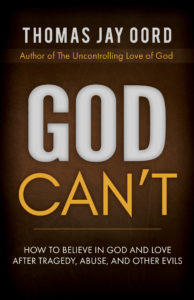Does God Love Everyone and Everything?
Does God love rapists and arms dealers? How about cancer and the coronavirus? And the devil? Does God really love all creation?
In my best-selling book, God Can’t: How to Believe in God and Love after Tragedy, Abuse, and Other Evils, I offered five answers to evil. Taken together, they explain why a God of uncontrolling love can’t prevent evil singlehandedly.
In my follow-up book, Questions and Answers for God Can’t, I write a chapter on what it means to say God loves everyone and everything. The present essay is an excerpt from that chapter.
What is Love?
“Love” may be the least defined among most frequently-used words in the English language. In various books, essays, and articles, I’ve defined love. This is the definition I find most helpful:
To love is to act intentionally, in relational response to God and others, to promote overall well-being.
The definition has three main phrases. The “intentional action” aspect says those who love act on purpose. Loving isn’t accidental; it isn’t happenstance. Love is a free and intended act. We say a person tried to love based primarily on her motive to promote well-being, not primarily on the outcome of her actions.
I don’t say love is a feeling. I’m not opposed to feelings, and I think love often if not always involves emotional and feeling aspects. Feelings play a major role in nearly every decision we make. But sometimes love requires us to act for good despite feelings pulling us in other directions. We may feel hate, disgust, or indifference toward someone, for instance, but we choose to love by acting for their good.
The second phrase says love involves response. We’re affected by our environment, histories, culture, situations, bodies, and so much more. We are relational creatures in an interrelated universe.
God is one among many actors and factors to whom we respond. As God acts moment by moment, God calls us to respond to the possibilities we encounter. We can respond properly or improperly. When we respond well, we love. As St. John put it, “We love because God first loves us” (1 Jn 4:19). Those who love act intentionally in relational response to God and others.
Love Aims to Do Good
The last phrase of my definition points to love’s goal: well-being. Love doesn’t act for the well-being of one or a few at the expense of the whole. It seeks overall well-being, even as it often focuses on particular goods in light of the common good.
Love sometimes requires self-sacrifice, of course. We sometimes act for the well-being of others to our own detriment. But at other times, we may have our own well-being primarily in mind as we promote overall well-being. In an interrelated world, the common good and my good often but not always coincide.[i]
When I say love promotes “overall” well-being, I’m not talking just about humans. “Overall” includes nonhuman creatures, plants, and smaller entities. It includes dimensions that are not just emotional, but also psychological, intellectual, social, economic, spiritual, and ecological. I even think our actions affect God’s well-being!
Love aims to do good.
God Loves Rapists?
We’re now better prepared to answer the questions raised at the outset. We’ve seen that lovers act to promote overall well-being. Let’s apply this understanding of love to God’s love for rapists, arms dealers, torturers, and embezzlers.
Some use the word “love” to describe approval, affirmation, or pleasure in what others do. For them, “love” is similar to “like” or “desire for.” But as I defined it, love acts for good. This sometimes means acting for good despite what others do.
God loves rapists, for example, because God acts for their well-being. But God doesn’t like rape. God knows what’s good for the rapist involves him avoiding rape, and that’s obviously also good for the potential victim.
We can apply this principle to everyone. God loves us no matter how mild, severe, or shameful our sins. God opposes what undermines well-being. But God wants the well-being of everyone, even those who commit heinous and destructive crimes.
God Loves Cancer?
Let’s apply this principle to God’s love for other actors and factors in existence. God loves all cells, for instance, even those that become cancerous. Rather than destroying them, God works to heal unhealthy cells. In every moment, God acts, invites, and offers opportunities for well-being at all levels and complexities of existence.
God also loves viruses, even the coronavirus. Unfortunately, many hear “virus” and assume such entities are intrinsically evil. This is not true. The vast majority of viruses make the world a better place. Most viruses promote overall well-being by enhancing species diversity, for instance. Less than 1% of viruses cause overall harm.
God calls, guides, or inclines cancerous cells and destructive viruses toward what promotes health. Sometimes, cells and viruses malfunction, mutate, or act in ways that harm. God works to restore and heal when they go awry.
When creatures, entities, or creation fail to respond well to God’s loving action, God doesn’t destroy them. God forgives and “turns the other cheek” in the effort to get them back on track to promoting what is good.
God even loves the devil and demons, in the sense of wanting their well-being. And their well-being means turning from evil, being healed, and living in love as God intends.
This principle is helpful to keep in mind when we think about treating one another. Rather than killing or destroying those who harm, we ought to work to heal, transform, and rehabilitate. Since all of us have done harm, we’re just doing unto others what we — as those who sometimes do evil — want done to us: loving them.
God’s Love Responds Too
Much more should be said, and I say more in Questions and Answers for God Can’t. But let me end with one more important point.
Saying God responds to cancerous cells, destructive viruses, rapists, arms dealers, and to all who harm implies that creation affects its Creator. To put it another way, God receives from creation.
Readers of God Can’t may have noticed I claimed that God not only self-gives and others-empowers but also receives and is affected. God is relational.[ii]
I believe saying God is affected by creatures and creation is crucial for understanding what it means to say God loves everyone and everything. If we say God is not affected, we cannot provide a view of love analogous to our love.
Without an analogy of love, “God loves you” makes no sense.
(This is a small portion of my chapter answering the question, “What does it mean to say God loves everyone and everything?” For the whole chapter and book, see this link.)
Footnotes…
[i] Brian McLaren writes eloquently about this love in chapter three of The Great Spiritual Migration (Hodder and Staughton, 2016).
[ii] For a book of introductory essays on relational theology, see Brint Montgomery, Karen Winslow, and Thomas Jay Oord, eds. Relational Theology: A Contemporary Introduction (San Diego: Point Loma University Press, 2012).




Comments